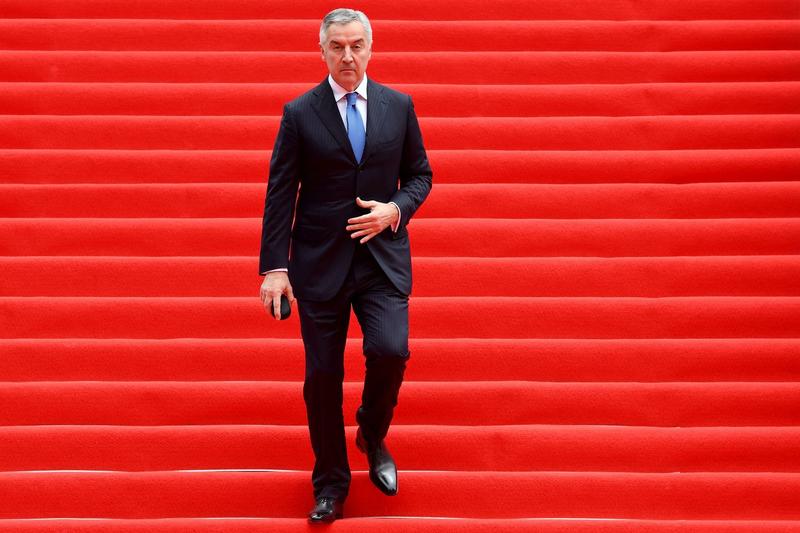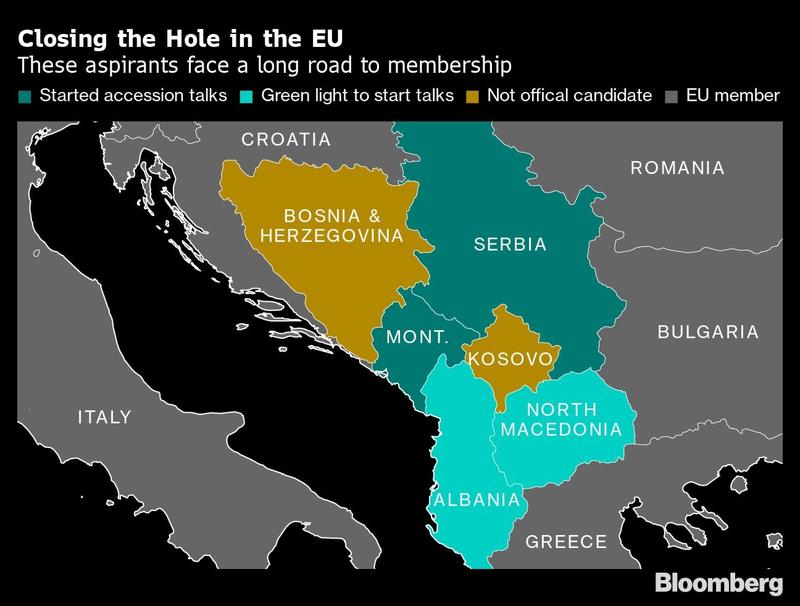 In this May 18, 2020 photo, Montenegro's President Milo Djukanovic walks down stairs ahead of a press conference in Cetinje. (SAVO PRELEVIC / AFP VIA GETTY IMAGES / BLOOMBERG)
In this May 18, 2020 photo, Montenegro's President Milo Djukanovic walks down stairs ahead of a press conference in Cetinje. (SAVO PRELEVIC / AFP VIA GETTY IMAGES / BLOOMBERG)
Montenegro’s ruling party won the most votes in Sunday’s elections but results suggested it may have to cede power to opposition parties that are vowing to unite against its leader, President Milo Djukanovic.
President Milo Djukanovic’s Democratic Party of Socialists, known as the DPS, won 35.1 percent, according to results from 98.5 percent of polling stations
The tight contest made it unclear who will lead the next government in a country that’s embroiled in the battle for influence in the Balkans between the European Union and NATO on one side and Russia and its allies on the other.
Djukanovic’s Democratic Party of Socialists, known as the DPS, won 35.1 percent, according to results from 98.5 percent of polling stations. An umbrella group of pro-Russian and pro-Serbian parties called For the Future of Montenegro won 32.5 percent, followed by 12.5 percent for another opposition alliance called Peace is Our Nation and 5.6 percent for one known as Black on White.
ALSO READ: Djukanovic vows EU path after sweeping Montenegro vote
Despite backing conflicting platforms ranging from the pro-Russian to euroskeptic nationalism to supporting European Union accession, the biggest opposition forces vowed to team up to oust the DPS with their slim combined majority. They campaigned on tackling endemic graft and ditching divisive policies under which Djukanovic has wielded power over the country of 620,000 as either president or premier almost continually since 1991.
“The regime has fallen,” said Zdravko Krivokapic, leader of The Future of Montenegro, said Sunday.
Djukanovic said his party would continue to fight for control and build a coalition with smaller opposition parties and those representing minorities.
“The battle for a parliamentary majority is still on,” he said early Monday.

Once an ally of late Serbian strongman Slobodan Milosevic, Djukanovic abandoned his patron in 1997 to become a staunchly pro-Western leader before orchestrating a formal split from Serbia in 2006.
His party, former Communists who rebranded themselves after the fall of the Iron Curtain, brought Montenegro into the North Atlantic Treaty Organization in 2017, a year after foiling a Russian-backed coup attempt he said was aimed at killing him on the same day as parliamentary elections.
Russia opposed Montenegro’s NATO entry and has resisted countries from the former communist sphere joining the EU. Among the six western Balkan nations seeking to join the bloc, Montenegro has advanced most on the path to accession and has the highest economic output per capita.
But the popularity of Djukanovic’s party has plunged following months of anti-government protests. They were triggered after the approval of a law on religious groups that may strip the local branch of Serbian Orthodox Church, the nation’s biggest denomination, of assets.
Opposition parties have accused Djukanovic of letting corruption thrive -- he has averted a number of investigations, including one over cigarette smuggling from Italy, across the Adriatic sea.
READ MORE: Balkan pair edges closer to EU goal
An earlier projection showed the top three opposition parties would take as many as a combined 41 of parliament’s 81 seats. But it remains to be seen whether they will be able to agree to rule together as pledged with their sharply conflicting agendas.
Djukanovic said his party and its likely allies would take 40 seats, too little for a majority but still close enough to create space for maneuver. As president, Djukanovic may grant the government-forming mandate to whichever party he thinks can muster a ruling majority.
“A majority for the opposition in Montenegro, tight but clear,” Florian Bieber, the director of the center of South East European Studies at the University of Graz, said in a tweet. “Dismantling the uninterrupted rule of the DPS for 30 (or 75) years is good for democracy. The challenge will be to bring together very heterogenous opposition.”


